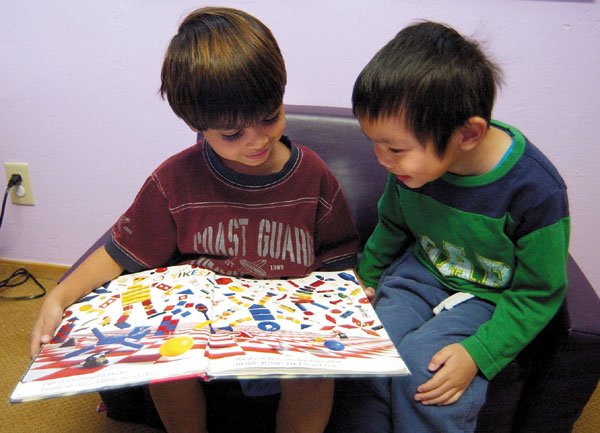Critics of Proposition 82 say the program will create giant
bureaucracy
Morgan Hill – Ashley Church leafs through the artwork, palm trees molded with layers of green and gold sequins, speckles of wet glue still clinging to the paper. When the 5-year-old locates her creation, she proudly explains that the golden orbs falling on either side of the tree are coconuts.
Ashley then moves to another activity. Children are granted a lot of freedom at Learning for Living preschool, that’s why parents choose the Morgan Hill-based Montessori-program, where the “teacher is more of a guide,” said owner Lauren Sisco.
The majority of California children attending preschool are enrolled in private programs like Sisco’s but that trend may change if Proposition 82 passes in June. The initiative, tagged “Preschool for All,” would afford all 4-year-olds the opportunity to attend a state-funded preschool for at least three hours a day, regardless of income.
Proponents claim Proposition 82 will strengthen education since more students will enter kindergarten prepared.
“Many of the students are not prepared,” Gilroy Teachers Association President Michelle Nelson said. “They enter school (not) knowing their letters and numbers.”
Socialization is another important component of preschool lost on students who don’t have the chance to attend. Preschool teaches children to share, she said.
“If there’s a quality preschool program it will teach them to learn to sit together and sit in a group,” she said. “A quality preschool is not daycare. A quality preschool is teaching them.”
When asked if she thinks preschool will become the new kindergarten if Proposition 82 passes and the majority of parents will opt to send their children, she said “I hope so.”
Backers of the measure also claim the measure will only affect about 1 percent or 100,000 taxpayers, since it will be fully funded by taxing wealthy Californians – married couples earning more than $800,000 annually and singles earning $400,000 a year.
But critics say if Proposition 82 passes it will end up impacting all taxpayers. The measure contains a clause guaranteeing full funding, which means all Californians will be left with the bill if enough cash isn’t raised by the top 1 percent.
Grover Norquist, president of Americans for Tax Reform, said the proposition would create a “massive tax increase,” and more wealthy Californians will flee next door to Nevada to escape the extra tax.
The measure would require full credentials for all preschool teachers working in the publicly funded institutions. The state already allots a large chunk of cash to pre-kindergarten programs, spending $210 million annually on preschool, $150 million on day care. The federally funded program Head Start costs about $500 million annually for California.
At least 66 percent of the population and about 80 percent of families earning more than $75,000 attend preschool. While only 49 percent of families earning less than $18,000 a year attend a similar program, according to the Proposition 82 initiative summary.
Only 70 percent of preschool-age Californians will eventually take advantage of public preschool, compared to the more than 66 percent already enrolled in private preschools, meaning the measure would place a perfectly well-run program into the hands of the government, Norquist said.
“You’re just bureaucratizing something that works fairly well now,” he said. “People get to decide if it’s fully funded, so they’ll always be demands for more.”
That’s the problem, if a privately-run program is successful, the government thinks it can reproduce those results, Norquist said.
“You just want to look at these people and say, ‘What makes these programs work is that they’re not run by the government, you’re not replicating it,'” he said.
Norquist predicts that once it’s free, fewer parents will take advantage of private preschools and the businesses will suffer.
But Sisco, the owner of Learning for Living, doesn’t necessarily think the proposition would have an adverse impact on her preschool. Parents sending their children to her school, a Morgan Hill establishment for 30 years, want their preschoolers to learn in a Montessori based environment.
Still, Sisco said she’s getting rid of her school’s kindergarten program, which has been a part of the school since its establishment, due to the small enrollment. Most parents send their children to kindergarten at local public schools, perhaps because they’re worried there won’t be enough room if they wait until the first grade, she said.
Also, Sisco’s not sure the government should take the reins of preschool. During her long tenure in education the preschool owner said she’s noticed that there’s much more pressure on young children at an early age.
“Kindergarten is what first grade used to be and first grade is what kindergarten used to be,” she said.












